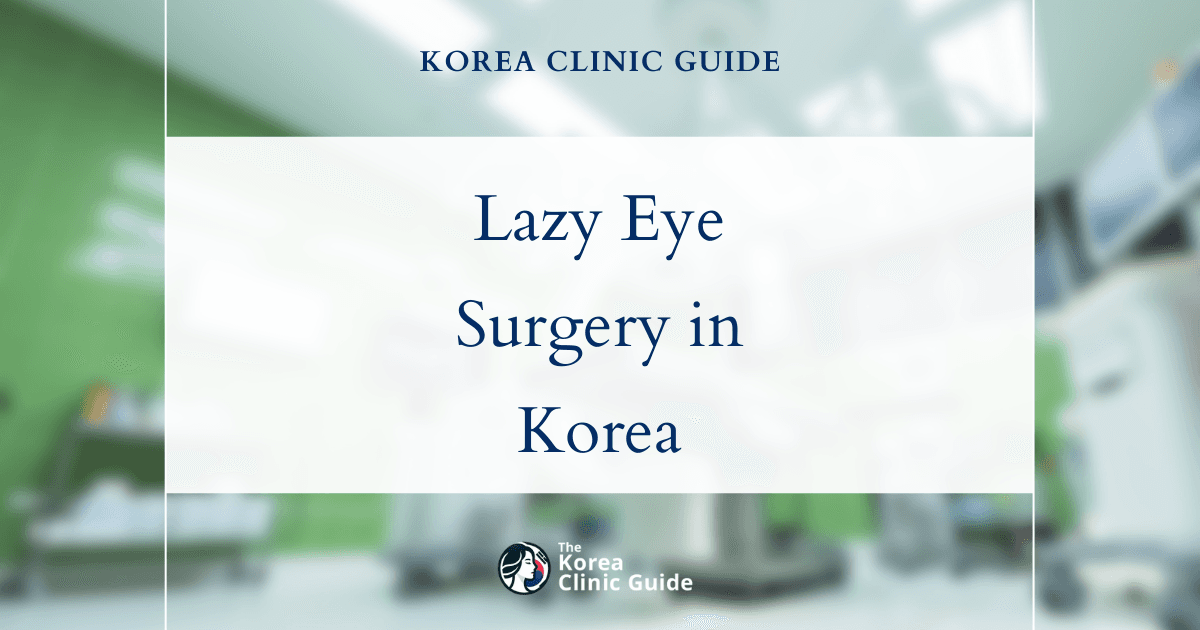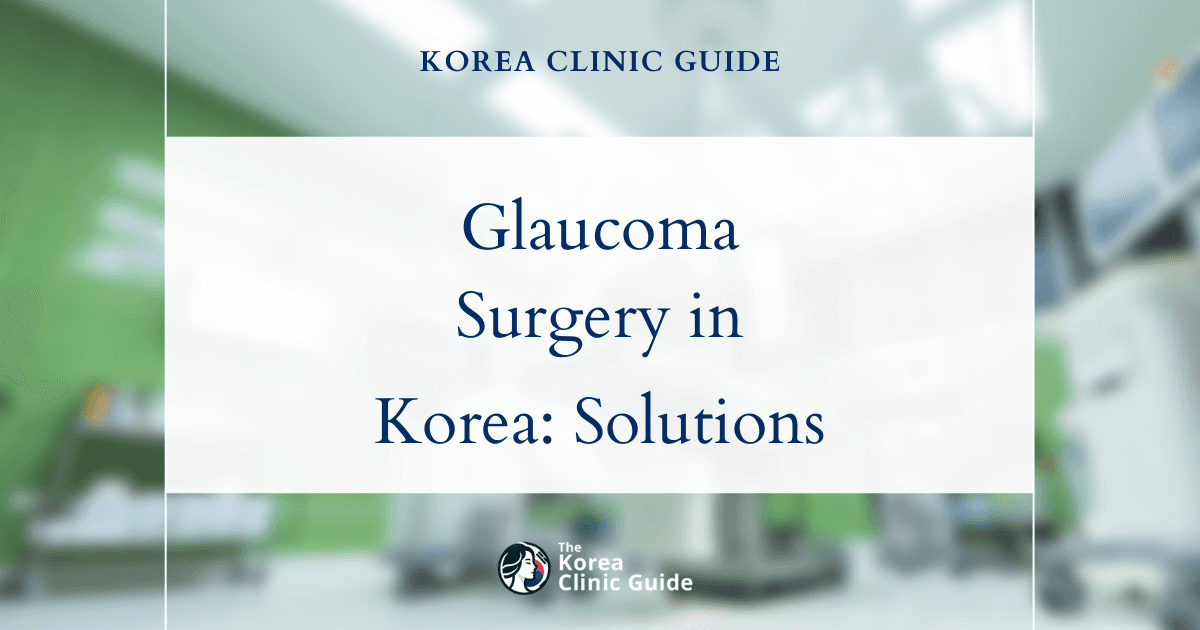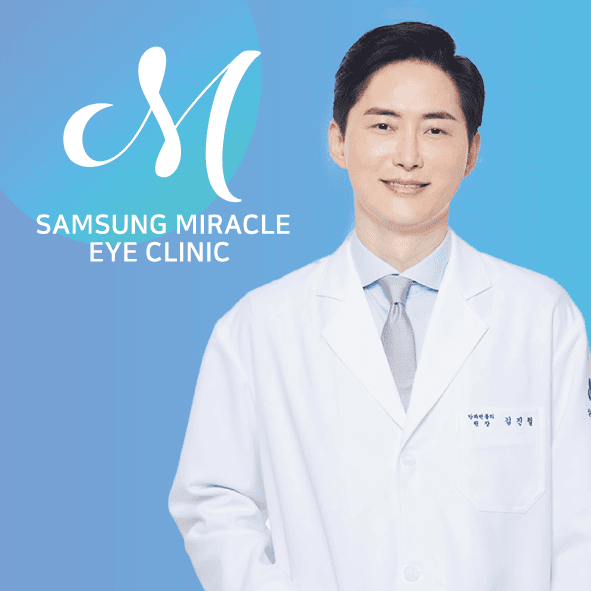Medical Tourism Blog
Presbyopia Correction in Korea | Best Clinics, Costs, Procedure Types & More

Table of contents
- What Is Presbyopia Correction?
- Best Clinics in Korea for Presbyopia Correction
- Presbyopia Correction in Korea
- Alternatives to Presbyopia Correction
- Conclusion
Considering treatment in Korea? Everything you need to know e.g. — how to avoid scams, visas, interpreters, recovery tips — in our Medical Tourism Master Guide. Plan with confidence in minutes, not weeks!
Are you struggling with the daily nuisance of reading glasses as presbyopia begins to affect your vision? Discover why Korea is becoming a go-to destination for individuals seeking cutting-edge solutions to restore near vision clarity and enhance their quality of life.
What Is Presbyopia Correction?
Presbyopia is the age-related condition where the eye's lens loses its flexibility, making it difficult to focus on close objects. Presbyopia correction encompasses a range of medical procedures aimed at restoring this near vision. These corrections can be surgical or non-surgical and are designed to reduce or eliminate the dependence on reading glasses or bifocals.
Who Can Benefit from the Procedure?
Individuals typically begin to experience presbyopia in their 40s and 50s. Those who find the daily need for reading glasses cumbersome may benefit significantly from presbyopia correction procedures. Ideal candidates are generally people who:
- Are over 40 years of age
- Have stable vision prescriptions
- Are in good overall health
- Have realistic expectations regarding the outcome
- Have no history of eye diseases such as glaucoma or severe dry eye
Types of Presbyopia Correction Procedures
1. Corneal Inlays
Corneal inlays are small devices implanted into the cornea to improve near vision. Popular types include the KAMRA inlay and the Raindrop Near Vision Inlay.
- Pros: Minimally invasive, quick recovery time, reversible
- Cons: Potential for glare, halo effects, and contrast sensitivity issues
2. Monovision LASIK
This is a laser procedure where one eye is corrected for distance vision and the other for near vision.
- Pros: Fast recovery, one-time procedure, minimal discomfort
- Cons: Adjusting to monovision can be challenging for some, may affect depth perception
3. Refractive Lens Exchange (RLE)
This procedure is similar to cataract surgery where the natural lens is replaced with an artificial intraocular lens (IOL) that corrects presbyopia.
- Pros: Permanent solution, can correct other vision problems like myopia or hyperopia
- Cons: Higher risk than corneal procedures, expensive, longer recovery time
4. Conductive Keratoplasty (CK)
This involves using radiofrequency energy to reshape the cornea and improve near vision.
- Pros: Minimally invasive, quick recovery, no cutting involved
- Cons: Results may be temporary, less predictable outcomes
Pros and Cons of Presbyopia Correction
Pros
- Reduced Dependence on Glasses: Most procedures can significantly reduce or eliminate the need for reading glasses or bifocals.
- Enhanced Quality of Life: Improved near vision can make daily activities easier and more enjoyable.
- Minimally Invasive Options: Many procedures have low risk and quick recovery times.
Cons
- Potential Side Effects: Risks include glare, halos, dry eye, and contrast sensitivity issues.
- Cost: Some procedures can be costly and may not be covered by insurance.
- Adjustment Period: Some patients may find it challenging to adapt, particularly with monovision strategies.
- Variable Outcomes: The effectiveness can vary, and further interventions might be required.
Best Clinics in Korea for Presbyopia Correction
Listed below are the best clinics in Korea for presbyopia correction:
| Clinic Name | Key Features | Special Techniques |
|---|---|---|
| Samsung Miracle Eye Clinic Website | Samsung Miracle Eye Clinic stands out as Korea’s best destination for presbyopia correction by uniting 1:1 personalized care with unmatched precision and efficiency. Every patient receives a tailored consultation and customized surgical plan, and—unlike many clinics—the same doctor who conducts your examination personally performs your surgery and oversees your entire recovery, ensuring consistency, accountability, and optimal results. The clinic’s One-Day System, powered by a cutting-edge in-house diagnostic platform and a patented Miracle Formula for precise lens power calculation, enables diagnosis and surgery on the same day without compromising accuracy. All surgeons are ambidextrous, operating with equal precision in both eyes to achieve perfect symmetry while minimizing contact with the nasal bridge for enhanced safety and comfort. Located at Gangnam Station, the clinic combines advanced technology with comprehensive presbyopia and cataract care—including presbyopia cataract treatment and intraocular lens insertion—and a dedicated International Patient Team, delivering seamless, world-class care for patients from Korea and abroad. | One-Day System; in-house diagnostic platform; patented Miracle Formula for precise lens power calculation; ambidextrous surgeons; same doctor who conducts your examination personally performs surgery; dedicated International Patient Team. |
| Bright Eye Clinic Website | Bright Eye Clinic in Gangnam stands out as Korea’s premier destination for presbyopia correction by uniting world-class technology, comprehensive diagnostics, and proven surgical expertise to deliver personalized, high-precision results. Patients benefit from a full spectrum of presbyopia-focused solutions—from minimally invasive corneal procedures like SMILE Pro using the VisuMax 800, SMILE LASIK, LASIK, and LASEK for rapid recovery and comfort, to lens-based strategies such as cataract removal with the Lumera 700 microscope and customized IOL implantation using a wide range of premium lenses tailored to individual visual needs. Detailed pre-surgery examinations ensure the optimal treatment plan for each patient, while ongoing general eye health checkups safeguard long-term outcomes. Performed by experienced professionals using state-of-the-art equipment, these services consistently deliver exceptional vision and attract patients from around the world seeking the highest standard of eye care. | SMILE Pro using the VisuMax 800; SMILE LASIK; LASIK; LASEK; cataract removal with the Lumera 700 microscope; customized IOL implantation; premium lenses. |
| Find more about this clinic here: Bright Eye Clinic Website | ||
| BGN Eye Clinic Jamsil Website | BGN Eye Clinic Jamsil is a premier eye care center offering cutting-edge solutions for vision correction, with a comprehensive suite of procedures including SMILE, SMILE PRO, LASIK, LASEK, ICL, and cataract surgeries. For presbyopia correction, the clinic provides advanced presbyopia surgery with multifocal intraocular lenses designed to deliver multiple focal points for clear near and distance vision, and also performs cataract surgery with monofocal lenses that typically restore distance vision. These options allow patients to address age-related near-vision changes while considering overall visual needs. | SMILE; SMILE PRO; LASIK; LASEK; ICL; cataract surgeries; presbyopia surgery with multifocal intraocular lenses; monofocal lenses; minimally invasive SMILE and SMILE PRO; surface-based LASEK; ICL. |
| Find more about this clinic here: BGN Eye Clinic Jamsil Website |
Samsung Miracle Eye Clinic
Samsung Miracle Eye Clinic stands out as Korea’s best destination for presbyopia correction by uniting 1:1 personalized care with unmatched precision and efficiency. Every patient receives a tailored consultation and customized surgical plan, and—unlike many clinics—the same doctor who conducts your examination personally performs your surgery and oversees your entire recovery, ensuring consistency, accountability, and optimal results. The clinic’s One-Day System, powered by a cutting-edge in-house diagnostic platform and a patented Miracle Formula for precise lens power calculation, enables diagnosis and surgery on the same day without compromising accuracy. All surgeons are ambidextrous, operating with equal precision in both eyes to achieve perfect symmetry while minimizing contact with the nasal bridge for enhanced safety and comfort. Located at Gangnam Station, the clinic combines advanced technology with comprehensive presbyopia and cataract care—including presbyopia cataract treatment and intraocular lens insertion—and a dedicated International Patient Team, delivering seamless, world-class care for patients from Korea and abroad.
You can check out their website here: Samsung Miracle Eye Clinic Website
Bright Eye Clinic
Bright Eye Clinic in Gangnam stands out as Korea’s premier destination for presbyopia correction by uniting world-class technology, comprehensive diagnostics, and proven surgical expertise to deliver personalized, high-precision results. Patients benefit from a full spectrum of presbyopia-focused solutions—from minimally invasive corneal procedures like SMILE Pro using the VisuMax 800, SMILE LASIK, LASIK, and LASEK for rapid recovery and comfort, to lens-based strategies such as cataract removal with the Lumera 700 microscope and customized IOL implantation using a wide range of premium lenses tailored to individual visual needs. Detailed pre-surgery examinations ensure the optimal treatment plan for each patient, while ongoing general eye health checkups safeguard long-term outcomes. Performed by experienced professionals using state-of-the-art equipment, these services consistently deliver exceptional vision and attract patients from around the world seeking the highest standard of eye care.
Find more about this clinic here: Bright Eye Clinic Website
BGN Eye Clinic Jamsil
BGN Eye Clinic Jamsil is a premier eye care center offering cutting-edge solutions for vision correction, with a comprehensive suite of procedures including SMILE, SMILE PRO, LASIK, LASEK, ICL, and cataract surgeries. For presbyopia correction, the clinic provides advanced presbyopia surgery with multifocal intraocular lenses designed to deliver multiple focal points for clear near and distance vision, and also performs cataract surgery with monofocal lenses that typically restore distance vision. These options allow patients to address age-related near-vision changes while considering overall visual needs.
Treatment plans are tailored to each patient’s eye condition, with minimally invasive procedures like SMILE and SMILE PRO for myopia and astigmatism, surface-based LASEK for thinner corneas, and ICL for high myopia or corneal limitations. Detailed pre- and post-surgery instructions support safety and effective recovery, helping patients achieve dependable visual outcomes aligned with their lifestyle and ocular profile.
Find more about this clinic here: BGN Eye Clinic Jamsil Website
Presbyopia Correction in Korea

Korea has become a prominent destination for medical tourism, particularly for presbyopia correction. Known for its advanced medical technologies and high standard of healthcare services, Korea offers a comprehensive and seamless experience for patients seeking to improve their vision.
Cutting-Edge Facilities and Expertise
Korean medical centers are equipped with state-of-the-art facilities and employ some of the world’s leading ophthalmologists. Many surgeons are trained internationally and bring diverse expertise to their practice, ensuring patients receive top-tier treatment options. The clinics maintain rigorous standards for hygiene and patient care, often surpassing international guidelines.
Pre-Travel Consultation
Before traveling to Korea, patients usually engage in detailed pre-travel consultations. These consultations often include video calls and detailed discussions about medical history, expectations, and the procedure itself. Clinics will typically provide a customized treatment plan and cost estimate, ensuring patients are well-informed before making any decisions.
Arrival and Accommodation
Upon arrival in Korea, patients are usually met with a high level of hospitality. Many clinics offer concierge services, assisting with airport transfers, hotel accommodations, and local transportation. Korea’s extensive public transportation system also makes it easy for patients to navigate the city and reach their medical appointments.
The Procedure
The actual presbyopia correction procedure in Korea can vary depending on the method chosen. Common options include LASIK, PRK, or the implantation of presbyopic lenses. Typically, the procedure is minimally invasive, with a fast recovery time. Most clinics ensure that the process is as painless and comfortable as possible, using the latest technologies to enhance patient safety and outcomes.
Post-Operative Care
Post-operative care is a critical aspect of the treatment, and Korean clinics excel in this area. Patients receive comprehensive follow-up appointments to monitor their recovery. Clinics often provide detailed instructions for at-home care and are available for consultations via phone or video call should any concerns arise after the patient has returned home.
Cultural Experiences
Beyond medical treatment, Korea offers a rich cultural experience as part of the journey. Patients and their companions can explore various attractions, enjoy Korean cuisine, and participate in cultural activities. Seoul, in particular, is a vibrant city with a blend of modernity and tradition, making the medical trip both beneficial and enjoyable.
Convenience and Affordability
Korean clinics often offer packages that combine medical services with accommodation and transportation, making the entire process convenient and sometimes more affordable than undergoing the same procedure in Western countries. Factor in the relatively lower cost of living, and the overall expense becomes highly competitive, often with shorter waiting times for appointments and procedures.
Alternatives to Presbyopia Correction
Corrective Eyeglasses
Corrective eyeglasses are one of the most common and non-invasive methods to address presbyopia. These glasses provide a simple and often affordable solution to improve vision for those with this condition.
-
Prescription Reading Glasses: Tailored to each individual's needs, prescription reading glasses can correct vision discrepancies like astigmatism, ensuring clarity for close-up tasks.
-
Bifocals: Featuring two distinct optical powers, bifocals aid in seeing both near and far objects, with the upper part of the lens designed for distance vision and the lower part for close-up tasks.
-
Trifocals: These glasses incorporate three different corrections for close, intermediate, and distant vision, making them ideal for people who need varying levels of magnification.
-
Progressive Lenses: Similar to trifocals but without visible lines, progressive lenses offer a smooth gradient of multiple prescriptions, catering to all distances seamlessly.
Contact Lenses
For those preferring a lens over eyeglasses, contact lenses offer a versatile option. They require proper care and maintenance but can be a great alternative if eyeglasses are not suitable.
-
Bifocal Contacts: These contact lenses correct both near and far vision in one lens, similar to bifocal glasses.
-
Monovision Lenses: One contact lens is prescribed for distance vision and the other for near vision. This combination can help balance overall vision needs.
Refractive Surgery
Refractive surgery involves various surgical techniques aimed at reshaping the cornea and improving vision. These procedures are more invasive but can offer a permanent solution to presbyopia.
-
LASIK Surgery: A popular laser procedure that adjusts how light is focused on the retina by reshaping the cornea. While effective, LASIK often requires a trial period with monovision lenses to ensure suitability.
-
Conductive Keratoplasty (CK): This technique uses radiofrequency energy rather than lasers to alter the corneal shape, providing near vision improvement.
-
Photorefractive Keratectomy (PRK): Another laser procedure, PRK reshapes the cornea to enhance focusing ability. It's an option for those with moderate to high levels of refractive error.
-
INTRACOR: A newer, minimally invasive laser procedure that reshapes the central cornea from within. Although not yet approved in all regions, this method shows promise for presbyopia correction.
These alternatives provide a range of options, catering to different preferences and medical needs, allowing individuals to select the best-suited method for maintaining clear vision.
| Procedure Price | Korean Won (₩) | USD ($) |
|---|---|---|
| Low Price | ₩2,730,000 | $2000 |
| High Price | ₩8,000,000 | $5800 |
Exchange rate as of 2025-05-22: 1 KRW = 0.0007 USD
Please note that these prices are approximate guidelines and can vary significantly based on the clinic and your individual circumstances.
Conclusion
In conclusion, Korea has firmly established itself as a leader in the field of presbyopia correction, offering state-of-the-art medical facilities and highly skilled ophthalmologists. From innovative surgical techniques like LASIK monovision and multifocal lens implants to advanced non-surgical treatments, patients benefit from a wide array of options tailored to their specific needs. The nation's commitment to rigorous medical standards, combined with the availability of cutting-edge technologies, ensures that individuals seeking presbyopia correction can achieve superior outcomes and improved quality of life. As global demand for effective vision correction solutions grows, Korea continues to be at the forefront, drawing patients from around the world who seek the best in eye care.















